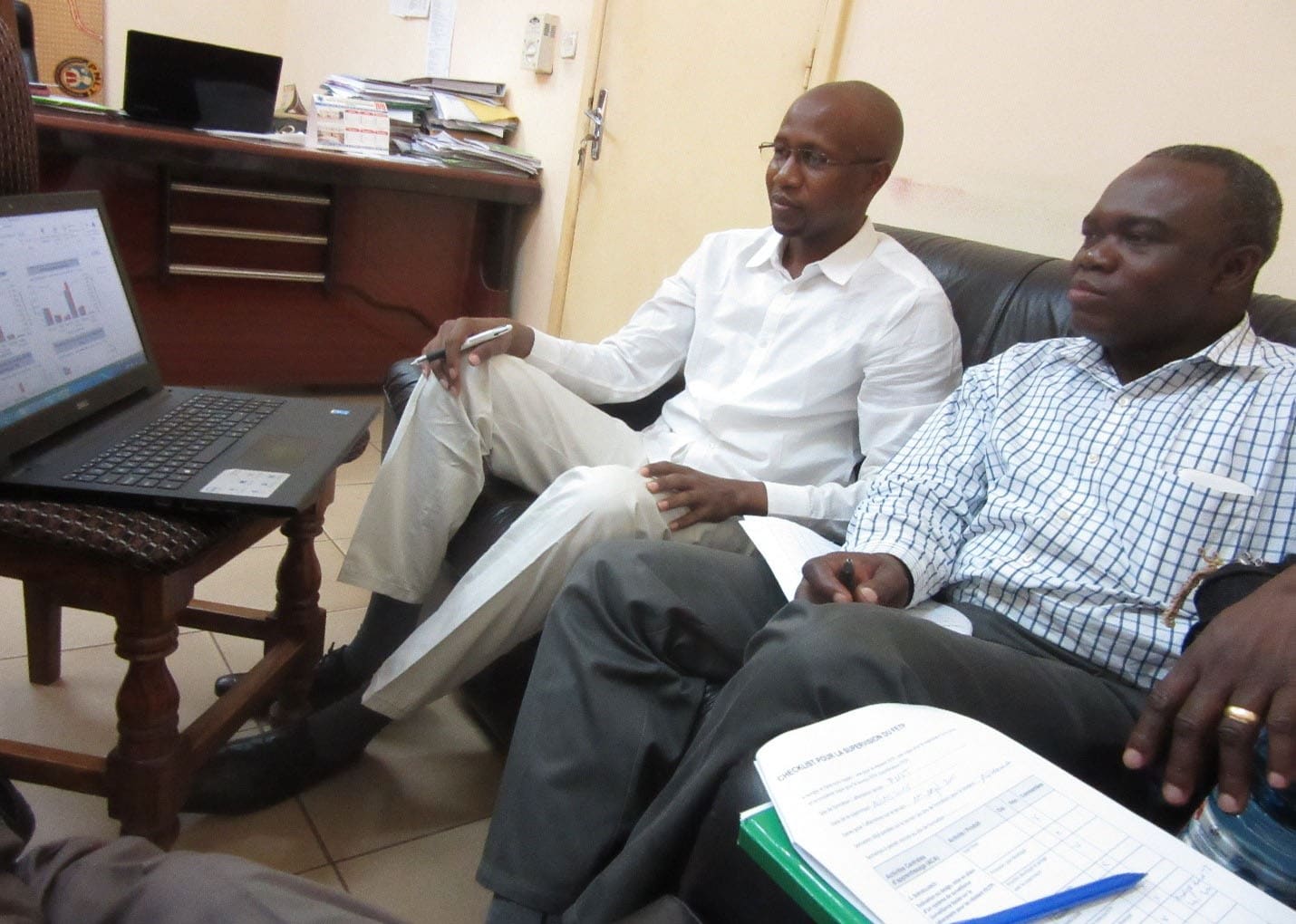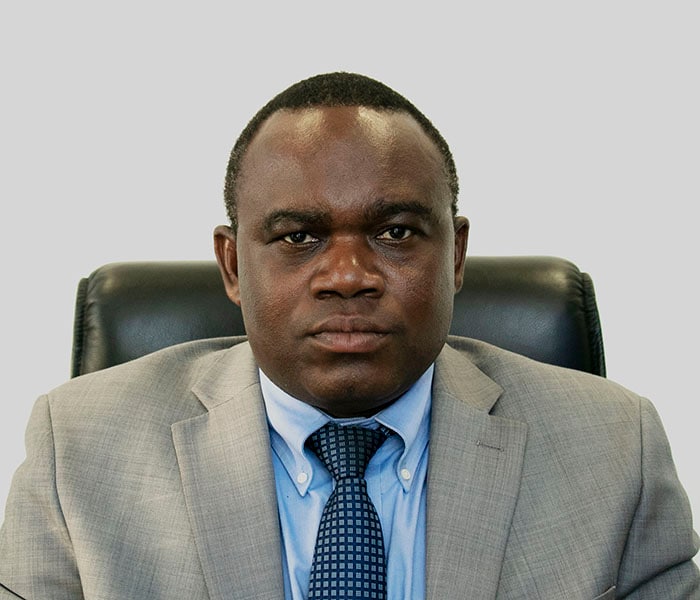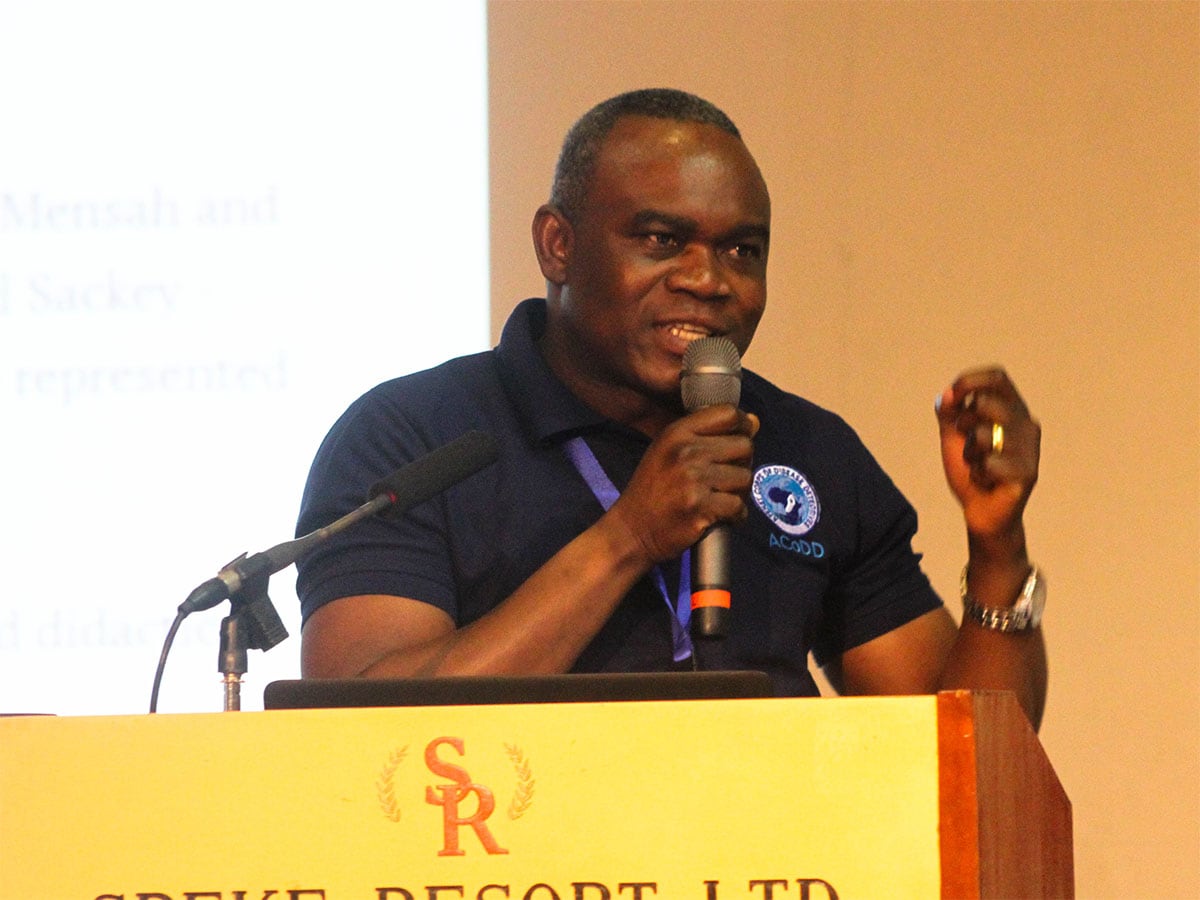Leading FETPs in Africa: Addressing Challenges and Reaping Rewards

Dr. Simon Antara mentoring Dr. Yaya Ballayira, a resident of West Africa FELTP, in Mali in 2017.
Dr. Simon Nyovuura Antara began his FETP journey as a resident in Kenya’s Field Epidemiology and Laboratory Training Program (FELTP) in 2006. Since then, he has contributed significantly to the expansion and growth of the program. Antara helped create two FETP programs in Africa and mentored residents as a resident advisor (RA). Currently, he is the Director of the African Field Epidemiology Networkexternal icon (AFENET). From his early days as a resident, to now leading AFENET, Antara’s FETP career track has had a profound impact in epidemiology across Africa.
Pursuing Public Health

Simon Nyovuura Antara, MBChB, MsC, MPH
Executive Director,
African Field
Epidemiology Network
Kenya FELTP graduate
I knew early on that public health was my calling. Undoubtedly, pursing this career path would allow me to positively contribute to addressing the many public health challenges facing both my home country of Ghana and the continent of Africa. After receiving a Bachelor of Medicine, Bachelor of Surgery, and a Master of Public Health (MPH) in Ghana, I decided to expand my knowledge and skills in public health. This calling led me to enroll in the Kenya Field Epidemiology and Laboratory Training Program (FELTP) in 2006. At that time, Ghana did not yet have a program. I graduated in 2008 with practical field epidemiology skills and a Master of Science in Applied Epidemiology.
Expanding Field Epidemiology Training Across Africa
Even before I graduated from FETP, I firmly believed that the knowledge and skills I was learning were precisely what was needed to develop and strengthen public health systems. I was convinced that Africa needed FETP expanded across the continent to build up its fragile health systems. I saw being an RA as an opportunity to contribute to this expansion. I was confident that my FETP training equipped me with knowledge, skills, and the right attitude to impact others with the same desire for change.
I had a great desire to share my newfound expertise with others to help build their skills in an essential field of practice that was not yet available to many. I wanted to help countries develop increased public health workforce capacity. The decision was easy when I was asked to be an RA and help start an FELTP in Rwanda. From January 2009 to July 2017, I was an RA for three different FELTPs across Africa. After starting the Rwanda program, I helped start the Namibia program, and ultimately returned to West Africa to become the RA for the FELTP in Burkina Faso (now called Burkina Faso FELTP).
As an RA, I had many opportunities to respond to outbreaks across Africa. In Rwanda, my residents and I investigated a foodborne botulism outbreak, outbreaks of cholera, typhus, measles, and more. In Namibia, we took part in outbreak responses to anthrax in animals and humans, typhoid fever, rubella, and measles, among others. During my time leading the West Africa FELTP, we investigated outbreaks of pertussis in Niger, Rift Valley fever in Mali, Lassa fever in Benin, and influenza A(H1N1) in Côte d’Ivoire. Overall, the impact of disease response efforts launched by FETPs across the continent cannot be overstated.
Two FETP Perspectives: From Resident to Resident Advisor

Dr. Simon Antara at the launch of the AFENET Čorps of Disease Detectives in Kàmpala in 2018.
I have had the privilege of experiencing FETP both as a resident and as an RA. As a resident, I appreciated being part of an effort to tackle public health challenges that could save lives. When an outbreak was controlled, I always felt a tremendous sense of joy and triumph. Seeing the health, economic, and social cost of a public health event mitigated and knowing that I have been a part of that effort, is very rewarding.
From an RA’s perspective, I witnessed residents who started with very little knowledge and virtually no skills in field epidemiology transform into good epidemiologists and disease detectives. Watching residents apply new knowledge and skills to stop an outbreak at its source was one of the most gratifying parts of the job. I felt an overwhelming sense of pride when a country’s leadership acknowledged the value of the FETP in addressing its workforce needs and when a country took ownership of its FETP and addressed the issues of sustainability and program quality.
The expansion of field epidemiology training throughout Africa has had an enormous positive impact on increasing the epidemiologic workforce, developing public health laboratory capacity, reducing outbreak response times, and strengthening surveillance and outbreak response systems. When I started my residency in Kenya, sub-Saharan Africa only had three FETPs covering four countries (Kenya/South Sudan, Uganda, and Zimbabwe); compared to 2020, where 31 countries in Africa now have an FETP presence.
In addition, the choice to implement different tiers of FETP (Frontline, Intermediate, and Advanced) made it possible for countries to decide which training type suits their needs. For example, following the Ebola Virus Disease epidemic in West Africa in 2014, many countries in the region implemented Frontline FETP. This resulted in the training of a significant number of health workers in disease surveillance, which proved to be critical in the response.
Since 2017, I have been working at the African Field Epidemiology Network (AFENET) in Kampala, Uganda. AFENET, established in 2005, is a networking and service alliance of FETPs and other applied epidemiology training programs covering sub-Saharan Africa. I was first Director of Programs, then became Acting Director in 2019, before being selected as the permanent Director in February 2020.
My 14 years of training and experience as a disease detective has culminated in the biggest battle of my career: the COVID-19 pandemic in Africa. Thankfully, my experience launching two FELTPs and serving as an RA has positioned me for success as the leader of AFENET, a key partner in Africa’s fight against COVID-19. The pandemic started just as I assumed the leadership of AFENET and it has presented new challenges, including travel restrictions that hamper FETP contributions and Ministries of Health (MoHs) difficulties in mobilizing resources. My team and I are working with diverse partners to identify creative solutions. These partners include MoHs across the continent, Africa CDC, U.S. CDC, the Bill & Melinda Gates Foundation, the SKOLL Foundation, Resolve to Save Lives, and the Mastercard Foundation, among others. Their financial and technical support includes supplying test kits, personal protective equipment, and the deployment of technical staff such as the AFENET Corps of Disease Detectives (ACoDD).
The Rewards of FETP
To anyone considering becoming an FETP resident or an RA, I offer some advice. It is an opportunity to make a meaningful contribution to public health. FETP provides the best opportunities for capacity development, and those who embrace such opportunities learn skills that are vital to them, their communities, countries, and the world. Being an RA is a very demanding and challenging job, but ultimately it is a very satisfying experience and certainly the best position for anyone with the desire to expand the frontiers of FETP.
